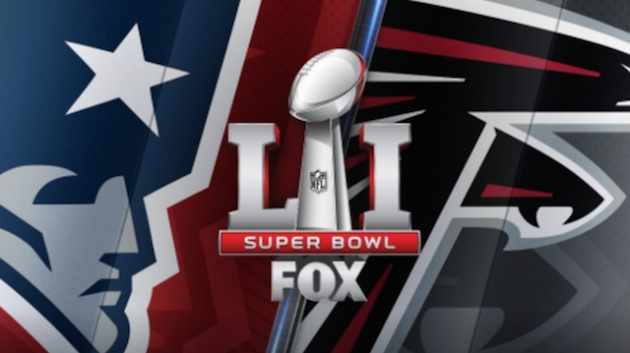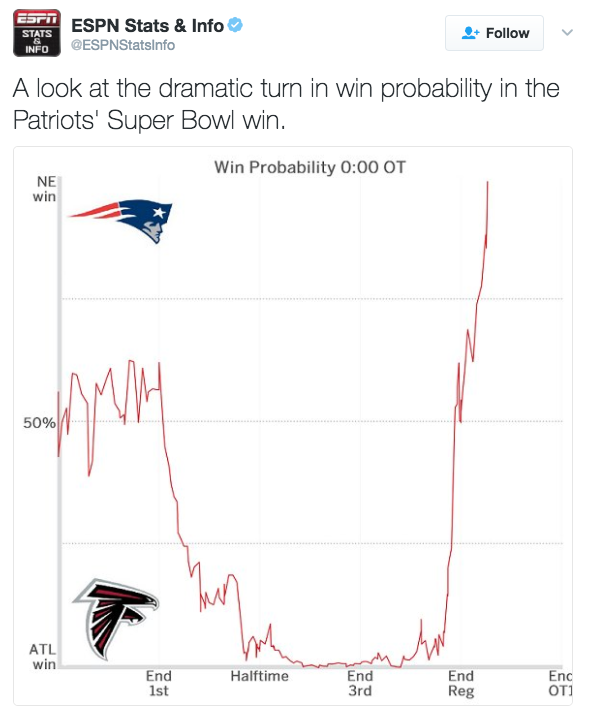
Super Bowl LI featured one of the most memorable games of all time, as the New England Patriots defeated the Atlanta Falcons 34-28 in overtime and captured their fifth Lombardi Trophy in franchise history.
The scoreline alone suggests an even back and forth game between the two best teams in the NFL, but anyone who watched the game knows that this was far from back and forth. It was almost as if the game featured two games within itself, one dominated by the Falcons, and the other by the Patriots.
Up until halftime, the Falcons had completely dominated the much more experienced Patriots, and lead 21-3. Furthermore, with 8:31 left in the third quarter, Atlanta went up 28-3 thanks to a six yard touchdown reception from running back Tevin Coleman. However, after this point, the Falcons were shutout for the rest of the game, with the Patriots scoring a seemingly unfathomable thirty-one unanswered points to steal the game away from Atlanta.

The twenty-five point comeback by the Patriots is currently the largest in Super Bowl history, with the second largest comeback also being mounted by the Patriots in Super Bowl XLIX, when they came back from being down ten points to the Seattle Seahawks. There is no doubt that the comeback in Super Bowl LI was the greatest comeback in the history of the NFL, specially when you account for the stage it occurred in and its significance.
This game once again displayed the greatness of both head coach Bill Belichick and quarterback Tom Brady as well as the “never say die” attitude of the entire New England Patriots’ roster. To most experts and fans, it cemented Brady and Belichick as the single greatest quarterback and coach in the history of the NFL.
While none of this can be denied, and tremendous amount of credit has to be awarded to the Patriots for pulling of this comeback, a lot of the blame should be placed upon the Falcons for their collapse. Super Bowl LI was a flat-out “choke job” by the Atlanta Falcons. It was the single biggest collapse on a big stage in American Sports history.
Throughout the second half, there were numerous occasions where if a single one of them were executed properly by the Falcons, they would have their first Super Bowl title. In fact, according to ESPN Stats & Info, “the Falcons’ win probability peaked at greater than 99.5% following Julian Edelman’s incomplete pass” on a third down trick play in the third quarter.
At this point, the Patriots were down 28-3 and faced a fourth and three at their own 46 yard line with 6:04 left in the third quarter. Brady completed a 17 yard pass to wide receiver Danny Amendola to convert the critical fourth down play. This drive eventually resulted in the Patriots’ first touchdown of the game thanks to a five yard touchdown reception by running back James White, with 2:06 left in the third quarter.
Due to the missed extra point by kicker Stephen Gostkowski, the Falcons still lead 28-9 and seemed to have halted any Patriots momentum after recovering an onside kick on the following kickoff. The Falcons got the ball at the 46 yard line of the Patriots and were almost in field goal range. However, despite the great field position, they were unable to capitalize as they went three and out and were forced to punt.
The Patriots went into the fourth quarter with the possession but were down by 19 points, and only managed to cut the Falcon lead to 16 points on the drive after being forced to take a field goal in the red zone. Although that turned the game into a two possession game, the Patriots still needed two stops on defense, two touchdowns, as well as two 2-point conversions in order to tie the game up.
Then, Atlanta possessed the ball with 9:40 left in the final quarter, and had a chance to chew time off of the clock. Instead, offensive coordinator Kyle Shanahan decided to pass the ball on third and one, resulting in a strip-sack by linebacker Dont’a Hightower that was recovered by Patriots defensive tackle Alan Branch.
This gave the Patriots offense the ball in great field possession—at the Atlanta 25 yard line—and could have been entirely avoided if the Falcons would have ran the football. Furthermore, the strip-sack was a result of a missed blocking assignment by Falcons’ running back Freeman, who was suppose to block Hightower on the blitz, but failed to do so, resulting in the Falcons’ first turnover in the game.
That turnover was the defining play of the game, as it shifted all the momentum in the Patriots’ favor. The Patriots offense quickly capitalized, cutting the Falcons’ lead to ten points after the touchdown reception by Amendola, and then to eight points after a successful 2-point conversion rush up the middle by White. This turned the game into a one possession affair with 5:56 left in the fourth quarter.
Still however, the Patriots defense needed to stop Falcons’ potent offense one more time. The Falcons drove to midfield, where wide receiver Julio Jones was able to make an inhuman acrobatic catch at the Patriots 22-yard line, somehow managing to drag his toes and keep both feet inbounds for a 27-yard completion. The catch by Jones would have been the most memorable play of the game, if not for another that came later in the fourth quarter.
With Atlanta having an eight point lead and possessing the ball near the red-zone, it looked as the comeback by the patriots would fall short. The Falcons were in field goal range and all they needed to do was run the ball, and kick a field goal to make it a two possession game and essentially seal the game
Instead, after losing one yard on a first down rush play, the Falcons decided to drop back and pass on second down. This turned out to be a huge mistake, as quarterback Matt Ryan took a critical sack from defensive end Trey Flowers for a loss of 12 yards, a sack which could have been avoided had Ryan thrown the ball away and not looked to get outside the pocket.
Still however, the Falcons were on the edge of field goal range at the New England 35 yard line. A couple of yards would have put them back into comfortable field goal range, but once again they chose to pass on third down and an offensive holding penalty pushed them ten yards further and out of the possibility of getting a practically game-ending three points.
A first and ten at the opposing twenty yard line turned into a fourth and thirty-three at the 45 yard line of the Patriots. These last mis-opportunities turned out to be the final nail in the coffin for the Falcons, as the league’s number one offense would not possess the ball for the rest of the game.
With the ball in his hands and 3:38 left in the fourth quarter, Brady surgically drove his team 91 yards, capped off by a 1-yard rushing touchdown by James White. Though, the highlight of the drive and the game as a whole was the 23-yard reception by wide receiver Julian Edelman, who managed to latch on to a deflected throw and snag the ball less than an inch off the ground. The Patriots completed the comeback after another successful 2-point conversion on a pass from Brady to Amendola, tying the game 28-28.
This sent the game to the first overtime period in Super Bowl history, where after winning the coin toss, the Patriots elected to receive the ball first. Once again, as he has done so many times in his illustrious career, Brady methodically drove the team down the length of the field. With a second and goal at the 2-yard line, James White scored a walk-off touchdown on a toss play to win the game 34-28 and give the Patriots their fifth Super Bowl in franchise history.
Questionable play-calling like Shanahan electing to run only five times after being up 28-3, as well as some key individual player mistakes like that of Matt Ryan taking the sack late in the game lead to Falcons losing their 25 point lead. However, another factor may have been the Falcons’ defense fatiguing in the final one and half quarters.
Up until the 13th minute of the third quarter, the Falcons had allowed no touchdowns and completely held the number three scoring offense in the league in check. However, despite having not scored a touchdown up until that point, the Patriots had had numerous long drives where they moved the ball, but could not capitalize. Furthermore, the Falcons’ points came on short drives and their offense had little success on drives that did not result in touchdowns. In fact, their offense only converted one out of eight third downs in the entire game.
This finally took a toll of the Falcons’ defense as they were completely out of gas by the time fourth quarter and overtime arrived and gave up thirty one points in the final 22 minutes of the game. The 82-yard pick-6 thrown by Tom Brady in the second second quarter contributed to the lopsided time of possession of the game, as it meant that the Patriots possessed the ball for eight in-game minutes to close out the half. An argument can be made that the interception even helped the Patriots in the long-run as it continued to fatigue the Falcons’ defense for the oncoming onslaught late in the game.
The final time of possession of the game was New England with a forty minutes and thirty-one seconds and Atlanta with 23:27. This lead to the Patriots running a staggering total of eighty-five offensive plays, while the Falcons ran a mere forty-six. This is another reason why the final quarter and the 2nd half in general, as well as overtime, turned out the way it did.
While there is no doubt that the on numerous occasions the Falcons’ blew away a chance at their first title, credit has to be given to the Patriots. After being down 28-3, with 8:31 left in the third quarter, New England had to play perfect football for the remainder of the game. And they just that, executing flawlessly on both offense and defense. While Atlanta stumbled, New England took advantage of every mistake and made history by mounting the largest and most impressive comeback in any Super Bowl ever.




